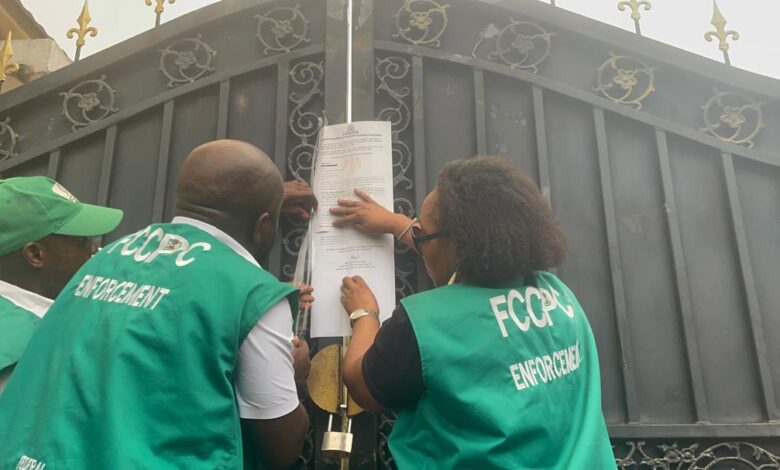FCCPC seals Abuja shops for selling local rice repackaged as foreign

The Federal Competition and Consumer Protection Commission on Tuesday raided Utako Market in Abuja, sealing several shops over alleged deceptive sales of local rice re-bagged and sold as popular foreign brands.
The operation, which was carried out with the support of police officers and other security personnel, targeted traders allegedly involved in passing off locally produced rice as imported varieties such as Royal Stallion and Mama Gold.
According to FCCPC officials, intelligence gathered indicated that these brands have not been imported into Nigeria since 2015.
More than five large shops stocked with different brands of rice were sealed during the raid, with owners directed to report to the FCCPC headquarters for further investigation.
Speaking to the press during the raid, Director of Surveillance and Investigation at FCCPC, Boladale Adeyinka revealed that the commission received credible intelligence indicating a widespread trend of rebranding local rice as foreign.
She explained that the practice was exploitative and misleading to consumers who prefer imported rice.
“The commission has resolved to carry out this ongoing operation to confirm and validate reports that local rice is being packaged as imported rice.
“That is exploitative. That is against consumer economic interests,” she said.
Adeyinka added that the rice bags bore branding of companies that had ceased exports to Nigeria nearly a decade ago.
“They are not imported. They are not from Thailand. In fact, for Mama Gold, all exports ceased as far back as 2015.
“This is 2025, and yet these brands still flood the market,” she said.
She noted that the FCCPC would follow due process to identify those behind the fraudulent packaging and would confiscate the implicated products.
Adeyinka warned that the commission would impose administrative penalties and fines on violators, adding that refusal to cooperate with investigators could result in prosecution.
She assured consumers that the FCCPC will continue its efforts to rid the market of deceptive practices and protect buyers from exploitation.
“We will follow the trail to identify those producing and branding local rice with foreign labels.
“The brand owners have already publicly announced they are no longer distributing in Nigeria. However, due to brand recognition, these cartels continue to exploit consumers,” she said.
Reacting to the development, Igwenma Alex, secretary of the Utako Market Shop Ownership/Traders Association, argued that traders were not informed about the ban on foreign rice brands.
“When something is banned, shouldn’t awareness be created for Nigerians? Even when you ban something, it’s not just about the traders—you’re protecting the entire nation,” he said.
One trader, whose shop was among those sealed, told reporters he was unaware the brands had been banned or were no longer imported.
He explained that he sourced his goods from Kaduna and Kano and would not have bought the rice if he had known it was counterfeit.
He said, “If I knew those products were banned or are no longer in the market, I would not have bought it. I buy my goods from Kaduna road and Kano.”





